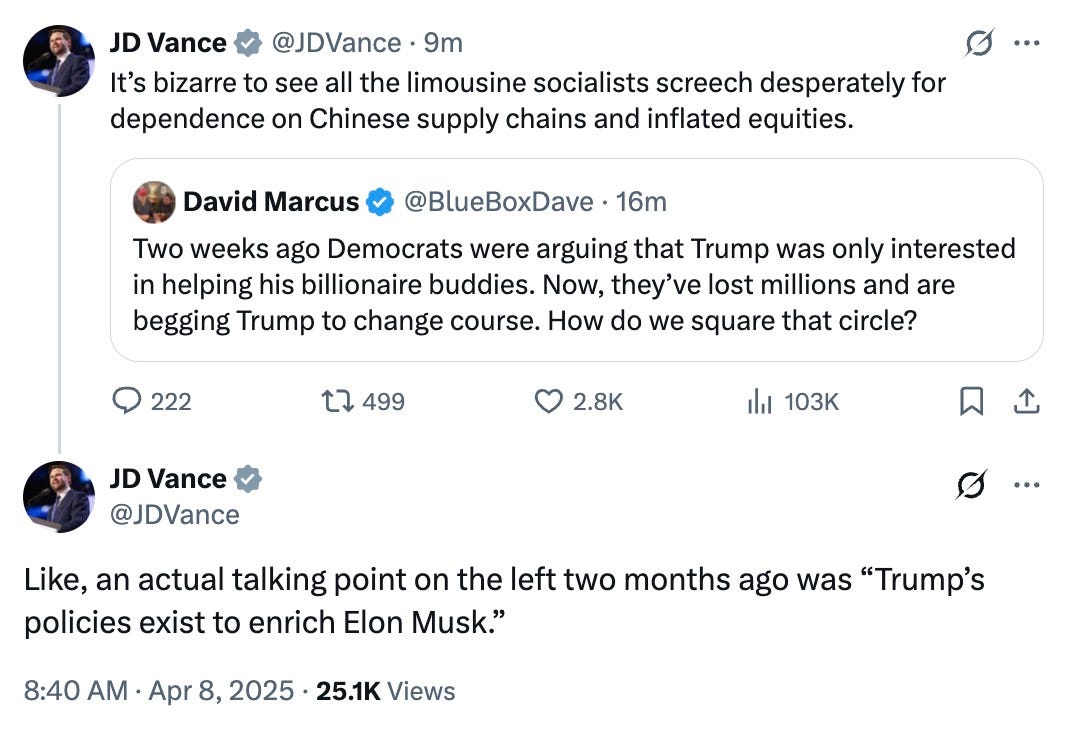
In a World of Pete Hegseths, Be a Maya Angelou
In a world of complex threats and challenges, the Department of Defense has decided to tackle one of the gravest: a quintessential piece of American literature.
We may be spiraling into an uncertain future of lawlessness, economic meltdown, and social instability, but at least we’ve got the galaxy-brain takes of our leaders to sustain us. On the vice president’s mind this morning:
Democrats say Republicans are sticking up for the billionaire class, but how can that be true if they’re crashing the economy and wiping billions off billionaires’ balance sheets? Checkmate, libs! Happy Tuesday.
The Purging of Maya Angelou
by William Kristol
More than 32 years later, I still remember January 20, 1993.
I was home, with nowhere to head off to early in the morning—a departure from my routine for the past four years.
I was tired, having spent the previous few days frantically cleaning out my office in the Old Executive Office Building and saying farewell to colleagues with whom I’d worked, always closely and usually collegially.
And I was a bit down. I was convinced that history would look kindly on the George H.W. Bush administration, of which I’d been a small part. But the judgment of future history is speculative, and the judgment of the voters the previous November had been real: We’d been chucked out of office.
So I watched Bill Clinton’s inauguration on TV, not paying very close attention, and I remember being only mildly interested as Maya Angelou read her poem “On the Pulse of Morning.”
That was partly, I suppose, because, sharing neither her politics nor what I took to be her sensibility, I hadn’t read Angelou’s 1969 autobiography I Know Why the Caged Bird Sings. And I’ll acknowledge that, as life has rushed on from 1993, I haven’t read it yet. But still, I recognize the work’s stature as a significant and influential part of our literary and cultural history.
Last week, pursuant to Defense Secretary Pete Hegseth’s order to purge so-called DEI content from military libraries and classrooms, I Know Why the Caged Bird Sings was removed, along with 380 other books, from the U.S. Naval Academy’s Nimitz Library.
Why?
Because impressionable midshipmen might follow in the footsteps of millions of other Americans, young and old, white and black, and be . . . what? Educated in aspects of American history and society they hadn’t personally experienced? Even—God forbid!—possibly influenced to have too favorable a view of diversity, equity, and inclusion?
To be clear: My sense is that the DEI movement over the last decade or two has featured a fair amount of foolishness, some of it overbearing and even offensive. There is no reason for public and private institutions not to review materials that were being used to promote DEI.
But Maya Angelou?
I Know Why the Caged Bird Sings is not “DEI content.” It’s a quintessentially American autobiography—a popular and important one. It’s a book a student at the Academy might want to read for his or her education, or for pleasure.
Angelou’s reputation and readership will survive being purged from the Nimitz library. Midshipmen can presumably still order the book from Amazon.
Still, it’s not a moment for national pride that Angelou’s book is being purged from a military academy.
And it is a moment to acknowledge that the attack on DEI by the Trump administration, and by many on today’s right, is not some kind of good-faith reconsideration of the excesses of the DEI industry over the last couple of decades. It’s far more an attack on the real diversity that characterizes today’s America, the real equity that a nation can aspire to, the real inclusion that marks a healthy society.
When I heard of the purge, I went back and read Angelou’s inaugural poem, “On the Pulse of Morning.”
These lines struck me now in a way they hadn’t in 1993:
Do not be wedded forever
To fear, yoked eternally
To brutishness.
Instead, as Angelou urges us earlier in the poem:
Give birth again
To the dream.
AROUND THE BULWARK
Yes, Elon Musk’s Vote-Buying Is Against the Law… People have gone to prison for comparable schemes, writes ANDY CRAIG.
Tariffs Weaken American National Power… The Trump administration drops the D.I.M.E., argues GEN. MARK HERTLING.
Bad Politics Poisons Science… The Atlantic’s Helen Lewis joins the Mona Charen Show to talk about Andrew Tate, the backlash to MAGA in Europe, and how polarization suppresses reasonable doubts about treatment of trans kids.
Anti-Vax Supporters Furious With RFK Jr. Over Measles Vaccine Statement… Robert F. Kennedy Jr.’s tepid support of the MMR vaccine amid a measles outbreak in Texas that’s led to the deaths of two children has spurred backlash from his conspiracy-addled backers. JVL and WILL SOMMER break it down.
Quick Hits
CARDBOARD COURT: The White House may have been crowing over the Supreme Court’s decision in the Alien Enemies Act case that the justices issued last night. But legal scholars say the verdict actually did strike a tiny but important victory for the due process of migrants facing deportation.
In a four-page, unsigned, 5-4 decision, the court ended the temporary order restraining the Trump administration from further deportations of Venezuelans to El Salvador under the AEA. The court’s reasoning stuck to procedural nuts and bolts: Migrants who wished to challenge their confinement and possible deportation, the court ruled, needed to do so in the place of their confinement (in this case, Texas), not via a class action in Washington, D.C.
But, but, but . . . The majority stressed that the administration must give potential future AEA deportees notice that they are subject to removal and the opportunity for judicial review: “The notice must be afforded within a reasonable time and in such a manner as will allow them to actually seek habeas relief in the proper venue before such removal occurs,” the majority opinion reads.
Still, the order appears to be in keeping with a troubling tendency of the Roberts Court: to look at Trump’s trampling of laws more as an opportunity to do some procedural tinkering on untested legal questions than a danger in need of reining in. Justice Sotomayor noted as much in her dissent: “The court,” she wrote, “should not reward the government’s efforts to erode the rule of law with discretionary equitable relief.”
The real test may come when the Court issues a ruling on the case of Kilmar Abrego Garcia, the Maryland man that the government acknowledges it sent to El Salvador despite a separate court order saying he couldn’t be sent there. The Trump administration is arguing that they don’t have the power to get him back because he’s no longer in U.S. jurisdiction. If the Court agrees with that, then it makes any talk of due process rights under the Alien Enemies Acts hollow. After all, what’s to stop the administration from grabbing migrants, shipping them off without any habeas petition, and then saying: Well, can’t do anything about that now?
For more on this case, watch this Bulwark+ Takes discussion between Sam Stein and Just Security’s Ryan Goodman.
MUSK AND MILTON: They may be simpatico on breaking the federal government, but Elon Musk and Donald Trump are way out of sync on tariffs. In addition to his weekend potshots at trade-war guru Peter Navarro, Musk also followed Trump’s Sunday comment that “we’re not going to lose a trillion dollars for the privilege of buying pencils from China” by posting a classic Milton Friedman lecture extolling the virtues of specialization and trade in pencil manufacturing.1
But the Washington Post reports today that Musk didn’t keep his petitioning and naysaying strictly on the TL. In fact, he tried to go over Navarro’s head to make a personal anti-tariff appeal to Trump himself:
The attempted intervention, confirmed by two people familiar with the matter who spoke on the condition of anonymity to discuss private talks, has not brought success so far; Trump threatened Monday to add new 50 percent tariffs on imports from China to go along with the 34 percent taxes he announced last week.
Who knew things would get so dumb so quickly that we’d be seeing issues where Musk is the voice of reason?
WE WRITE TO LODGE OUR DEEP CONCERN: “The Trump Administration’s never-back-down style is becoming a governance problem with overtones of cruelty,” the Wall Street Journal editorial board writes of the case of Kilmar Abrego Garcia:
On Saturday Justice suspended attorney Erez Reuveni, who had acknowledged in court filings that Mr. Abrego Garcia was the victim of an “administrative error” who “should not have been removed to El Salvador.” Attorney General Pam Bondi wasn’t happy. Mr. Reuveni “shouldn’t have argued [the case], if that’s what he was going to do. He’s on administrative leave now,” the AG said . . .
Asking attorneys to put aside professional legal judgment in service of President Trump is asking them not to perform the job they were hired to do. The traditional role of government lawyers, especially in the executive branch, is to help policy makers interpret laws and govern in ways that withstand constitutional challenge.
The Trump Administration hates to admit an error, but its obstinance here serves no purpose. Mistakes happen. Why not ask the Salvadoran government to send Mr. Abrego Garcia back to unite with his family?
The business press loves Trump when they can imagine him as jerkwad Ronald Reagan, delivering traditionally conservative policy while indulging in mean tweets. That was always a fiction, but that fiction is becoming less and less sustainable under the open cruelty and radical chaos of the second Trump administration.
Still, it’s respectable that the Journal is willing to speak up on this. Elected Democrats should ask themselves: Am I willing to go at least as far sticking up for due process rights as the Wall Street Journal? So far, with few exceptions, they haven’t been.
Cheap Shots
One of Trump’s most notable tics has always been the way little fragments of arguments he’s heard recently leak into his stream-of-consciousness weave. Somebody has 100 percent been trying to make the Friedman pencil case to the president.





















The story of the wreckage of this administration will be new Trump voters getting what they voted for and protesting non-voters choking on self-righteous false equivalence between the parties.
Hispanic men voted to deport people without due process, imperiling themselves and their families. Arabs in blue states enabled Trump Gaza and actual ethnic cleansing. Black men were so irate over cancel culture that they voted for canceling Maya Angelou. Tech bros voted for tariffs and the elimination of H1B visas. Lots of folks who couldn't pull the trigger for Harris because they're too online to exist in the real world, who didn't seem to know what they were voting for despite the two candidates making the choices very clear.
If the great danger of DEI was that it would cause organizations like the Defense Department to lose sight of its core mission, why do I get the sense that the obsession of the current regime with DEI eradication is way more distracting than the implementation of DEI ever was to the old?